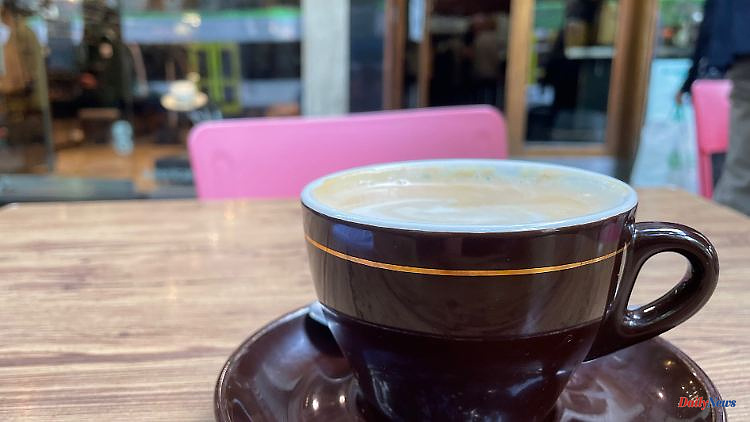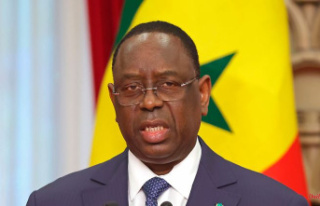With good coffee, many think of Italy and are certainly not wrong. But the secret coffee capital of the world is Melbourne, Australia. In the 1950s, European migrants brought their love of Long Black or Flat White with them.
A barista skilfully operates the various levers of the large espresso machine, which sits enthroned on a long wooden counter. People are sitting on wine-red bar stools, reading the newspaper or chatting. It smells of leather, coffee and a bygone era: "Pellegrini's Espresso Bar" in Melbourne is one of the oldest cafés in the city that is still in its original condition.
In the metropolis celebrated worldwide for its coffee culture, the restaurant is probably the most traditional address par excellence. The red and green neon sign that reads "Open 8AM" in the window, the checkerboard floor tiles and family photos from different decades on the walls - the café has changed little since it opened in 1954 in Melbourne's city centre. "A lot of people tell us they feel like they're coming home or to their grandmother's," says current owner David Malaspina. Then his barista serves a flat white in a brown cup - an Australian take on a small latte, but with a stronger coffee flavor. It's one of the best in town, guests agree.
No other place in the world has as many cafés per capita as Melbourne. That's why Australia's second largest city is also known as the coffee capital of the world. The love for the roast bean dates back to the 1950s. "After the war, many Europeans and many other nationalities came to this wonderful city," says Malaspina. "And everyone brought their culture with them. For us, that's the coffee."
It is mainly Italian and Greek immigrants who bring the first European espresso machines to the city. According to legend, "Pellegrini's Espresso-Bar" was the first café with such a coffee machine, which was completely revolutionary at the time - but this has not been proven. In 1974 Sisto Malaspina, an Italian immigrant, took over the espresso bar together with Nino Pangrazio.
The duo not only manages to make the café even more popular, they both also become local heroes. When Sisto Malaspina was stabbed to death near his café in a terrorist attack in November 2018, the entire city mourned. "He was always here, six days a week," says David Malaspina about his father Sisto. "He loved people, was always telling stories and was exceptionally sociable." The coffee icon even gets a state funeral for which thousands of people gather.
Today, Melbourne's coffee scene blends tradition with innovation. Although classic long blacks (espresso lengthened with hot water) and flat whites (espresso with slightly frothed milk and very little milk froth) are still among the most popular coffee drinks, there are also new trends. These include the somewhat mysterious Magic, which is hard to find outside of the city and is rarely on the drinks menu even in Melbourne. But initiated coffee aficionados can order the pick-me-up, which consists of a double ristretto (an espresso variant) with lightly frothed milk, from experienced baristas. Melbourne's residents are considered real "coffee snobs" and have correspondingly high demands on their beloved hot drink. Chains like Starbucks can hardly keep up with the city's more than 2,000 coffee shops.
Many bars and roasting houses, for example, value "single origin coffees" - coffee beans whose cultivation can be traced down to the smallest detail. The brewing techniques are also constantly being developed. The "pour over" method, in which hot water is poured through ground coffee in a filter directly into the cup, is popular. "Cold brews" are also on the rise: The beans are ground a little coarser and covered with cold water and placed in the refrigerator for twelve hours. This should result in a less acidic coffee.
Meanwhile, the art of coffee-making continues to be perfected by Melbourne's many baristas. One of them is reigning World Barista Champion Anthony Douglas. The 31-year-old prevailed against international competition at the World Barista Championships, which appropriately took place in his hometown of Melbourne in 2022. Among other things, he served the judges a "signature drink" made from Colombian espresso with honey, lacto-fermented passion fruit and cold-brewed hibiscus tea. "First I fell in love with the process of making coffee. Then I got to know some really great coffee specialties," says Douglas. "I realized how extraordinary coffee can be." The star barista expresses his love for the brown bean in sophisticated creations, for which he combines precise techniques with completely new flavor combinations.
For Douglas, coffee is both theoretical knowledge and art: "I think you have to first understand the science behind making coffee," he says. "Once you've done that, you have the freedom to express coffee in different ways, just like any other art form." Despite his sophisticated creations, with which he pampers his customers' palates, he likes things to be simple himself: Depending on his mood, Douglas drinks espresso, flat white or simply filter coffee.
"Pellegrini's Espresso Bar" also focuses on the essentials: If you're looking for turmeric lattes and iced frappuccinos with soy milk, you've come to the wrong place. Managing Director David Malaspina is not just about good coffee, but also about the social component that has always been part of the cult drink: "Coffee offers a way to start conversations and is a good excuse to meet up," says he. Also at the other end of the world.












